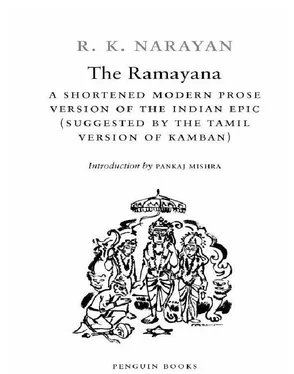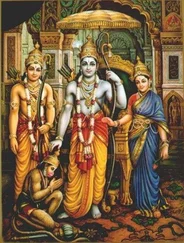Махариши Вальмики - The Ramayana
Здесь есть возможность читать онлайн «Махариши Вальмики - The Ramayana» весь текст электронной книги совершенно бесплатно (целиком полную версию без сокращений). В некоторых случаях можно слушать аудио, скачать через торрент в формате fb2 и присутствует краткое содержание. Жанр: Старинная литература, на английском языке. Описание произведения, (предисловие) а так же отзывы посетителей доступны на портале библиотеки ЛибКат.
- Название:The Ramayana
- Автор:
- Жанр:
- Год:неизвестен
- ISBN:нет данных
- Рейтинг книги:3 / 5. Голосов: 1
-
Избранное:Добавить в избранное
- Отзывы:
-
Ваша оценка:
- 60
- 1
- 2
- 3
- 4
- 5
The Ramayana: краткое содержание, описание и аннотация
Предлагаем к чтению аннотацию, описание, краткое содержание или предисловие (зависит от того, что написал сам автор книги «The Ramayana»). Если вы не нашли необходимую информацию о книге — напишите в комментариях, мы постараемся отыскать её.
The Ramayana — читать онлайн бесплатно полную книгу (весь текст) целиком
Ниже представлен текст книги, разбитый по страницам. Система сохранения места последней прочитанной страницы, позволяет с удобством читать онлайн бесплатно книгу «The Ramayana», без необходимости каждый раз заново искать на чём Вы остановились. Поставьте закладку, и сможете в любой момент перейти на страницу, на которой закончили чтение.
Интервал:
Закладка:
He did not like the idea of being received by Kaikeyi in the kopa gruha (the room of anger, which was a part of a dwelling where one could retire to work off a bad mood); and when he went in, he found her sprawling on the floor in semidarkness, hair dishevelled, the flowers she had been wearing torn off, her jewellery scattered, clad in indifferent clothes, and not noticing his arrival. He stooped down to ask softly, “Are you unwell?” She gave no answer to his question till he repeated it, and then answered dully, “Oh, in perfect health, in every way. No physical sickness of any kind.”
“I am sorry. I was delayed. I waited because I wanted to bring you the news personally. I knew it would make you happy indeed, and wanted to have the pleasure of watching your joy.”
Kaikeyi condescended to mutter, “I knew it, I am not so stupid or deaf or blind as not to know what is going on.”
In that darkness and in the manner she had turned her face down, he had no means of judging the mood in which she spoke. It was difficult to be bending down so low, and he pleaded, “Why don’t you get up and sit on that couch, so that I may sit beside you comfortably and listen to you?”
“You may seek all the comfort you want. I need none of it. Dust and rags are my lot hereafter.”
“What makes you talk in this manner? Get up and share the happiness of the whole country. Let us drive around in your chariot and see the joy that has seized the people.”
“I want to be dead. That’s all. If you could send me a bowl of poison, that would be more welcome to me now.” It was most awkward for him to crouch or sit on the floor trying to appease her. His joints ached and creaked. But she would not budge. It was no time to call up an attendant, and so he pushed a foot-stool beside her and lowered himself onto it. After a great deal of cajoling, she announced: “Swear to me, by all that is holy, that you will grant me what I ask for; otherwise let me die in peace.”
“I have never said no to you. You shall have whatever you want.”
“Will you swear by Rama?” she asked.
He evaded a direct answer, as he felt uneasy at the mention of Rama’s name. “Tell me what you want,” he said clearly.
“You offered me two boons long ago. You may have forgotten it, but I haven’t. May I mention it now?” Now she had sat up, and it was less irksome to communicate with her. He tried to reach out and touch her, but she pushed his hand off. “On that battlefield when you went to the rescue of Indra and fainted, do you remember who revived you?”
“Yes,” he said. “How can I forget it? I have lived to see this day because I was revived, otherwise that evening any chariot wheel could have rolled over me.”
“Great memory you possess. I am glad you remember that far. And do you remember also who nearly gave her life to nurse and revive you?”
“Yes.”
“What did you promise her in return?”
The king remained silent a moment, then said, “I have not forgotten.”
“Bear with me if I repeat some small details that might escape your recollection. Let me help you. You said, ‘Ask for two boons of your choice and you shall have them.’ And then what did she do?” When he failed to answer, she added, “I said I would wait to take them, and you vowed, ‘Whenever you like—even if it is a hundred years hence, you shall have whatever you ask for.’ ”
The King, who was becoming increasingly uneasy, simply said, “I see that the time has come for you to ask.” There was no cheer in his tone. He was seized with dismal forebodings.
“Should I speak about it or not?”
“Get up and put on your festive clothes and jewellery so that you may shine like the resplendent star that you are. Let us go.”
“Yes—in proper time—after you have fulfilled your promise to me.” He had completely lost all courage to let her mention them. The sound of words such as “promise,” “vow,” “fulfill,” “boon” shook his nerves. She looked up at him with tears in her eyes. He dared not look at her; he knew that he would be overwhelmed by her charms, and when she said presently, “Leave me now. Go back to your Kausalya and feast and enjoy. Leave me to myself.” It was not necessary for her to mention “bowl of poison” again. He knew she meant it, and the prospect unnerved him. He said passionately, “You know how much I love you. Please, come out of this room and this mood.”
“You have promised me the granting of two boons, and you have sworn to it in the name of Rama—your darling son Rama. And now I’ll speak out my mind. If you reject my demand, you will be the first of the Ikshvahu race, proud descendents of the sun god himself, to go back on a promise for the sake of convenience.” She took breath and demanded, “Banish Rama to the forests for fourteen years; and crown Bharatha and celebrate his enthronement with the arrangements you have already made.”
The King took time to understand the import of this. He got up to his feet muttering, “Are you out of your mind? Or joking or testing me?” He moved away from her in search of the couch. He felt faint and blind, and groped about for a place to rest. He reclined on the couch and shut his eyes. She went on. “Send a messenger to fetch Bharatha at once. . . . He is quite far away. Give him time to come back. Tell Rama to take himself away.”
“You are a demon,” he whispered with his eyes still shut.
“Don’t curse me, great King. I am not surprised that you find me less agreeable than Kausalya. Go on, go back to her and enjoy her company. I never asked you to come here and curse me. I retreated here just to avoid you.”
The night continued in this kind of talk. Dasaratha made a last effort at compromise: “Very well, as you please. Let Bharatha be crowned. . . . But let Rama also stay here. You know him. He will hurt no one. Let Bharatha be the king by all means—he is good. But please, I’ll touch your feet—I don’t mind prostrating before you—but let Rama stay here in his own home and not go away. How can he walk those rough forest paths and go on living in the open, unsheltered . . . ?”
“He can, he is not the soft infant you make him out to be. For fourteen years he must live away, wear the bark of trees, eat roots and leaves. . . .”
“Do you want him to die . . . ? Ah . . .” The King screamed.
She merely said, “Don’t create a scene. Either you keep your word or you don’t, that’s all.”
The night spent itself in dead silence. Kaikeyi stayed where she was on the floor; the King lay on the couch. No one interrupted them. It was customary not to disturb when the King was with one of his wives. Even servants kept themselves out. For all that, it was inevitable that the King should be sought out sooner or later. There were many matters on which he had to be consulted. His chief minister was at his wit’s end. “Where is the King? Where is the King?” was the constant question.
The assembly hall was growing crowded with distinguished guests and the public who thronged in to watch the coronation. Rama, clad in simple silk robes after several ritual baths and purification ceremonies ordained by the chief priest, was also ready, waiting for the ceremonial dress. A little before the dawn, the holy fire was lit in which offerings were to be placed to please the gods in heaven. The priestly groups were already chanting the sacred mantras in unison. Music from many sources filled the air. The babble of the crowd was continuous. But in the inner ring where the chief minister and other immediate executives were assembled, there was concern. “The King should have arrived by now. He must initiate the rites; he has to receive the rulers who will soon be arriving. . . .” The chief minister, Sumanthra, got up to find out the reason for the delay. Things had to go according to a time-table in every detail so as to synchronize with the auspicious movement of the stars. And any single item delayed would throw the entire ceremony out of gear. Sumanthra left the assembly hall and went in search of the King. He hesitated for a moment at the door of the kopa gruha, but parted the curtains, opened the door, and entered. The sight before him, naturally, startled him. “Is His Majesty unwell?” asked the minister. “Asks him yourself,” replied Kaikeyi.
Читать дальшеИнтервал:
Закладка:
Похожие книги на «The Ramayana»
Представляем Вашему вниманию похожие книги на «The Ramayana» списком для выбора. Мы отобрали схожую по названию и смыслу литературу в надежде предоставить читателям больше вариантов отыскать новые, интересные, ещё непрочитанные произведения.
Обсуждение, отзывы о книге «The Ramayana» и просто собственные мнения читателей. Оставьте ваши комментарии, напишите, что Вы думаете о произведении, его смысле или главных героях. Укажите что конкретно понравилось, а что нет, и почему Вы так считаете.












